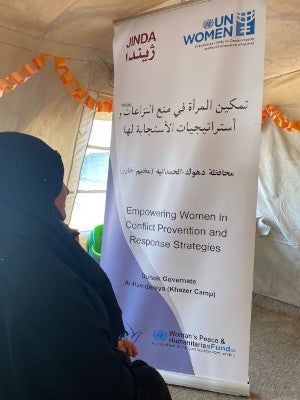Bringing Hope to Displaced Iraqi Women with Life Skills on Coping
Date:
Sakna Hassan Mahmoud (32), is from Husniya, a village on the outskirts of Mosul city. In 2017, clan conflict erupted in the village and fearing for her safety and that of her children, Sakna fled and eventually found her way to Khazer camp. Sakna was a child bride, married when she was 13 years-old to a 22 year-old man. Her husband worked as a guard in the Husniya area but died in 2016, leaving Sakna a widow with five children. Sakna also lives with her sickly mother and her sister who is also widowed with children.

Completing just elementary education Sakna has worked for several organizations conducting awareness for the camp residents to empower women in conflict prevention and response strategies. Although currently not working, she was able to develop her potential through the assistance of UN Women-supported NGO’s and CSO’s providing training and workshops for women in the area.
Sakna faces daily challenges just to survive. A family of women in a patriarchal society is extremely vulnerable with no breadwinner, and without the financial means to meet their daily needs. The family home in Husniya was destroyed when conflict broke out and a return to the homestead is beyond the family reach with unaffordable rents and no opportunities for employment in her village. “It is my dream to go back to my village one day,” said Sakna.
Facing day-to-day issues was difficult for Sakna when her husband died. Women are not empowered to solve problems as the men in the family make the decisions. “I was facing difficulties dealing with people around me and knew nothing of how to solve our problems,” she continued. “There was shame in living in a camp and that brought about psychological pressure, which made me feel nervous, frustrated and irritable.” However, the Women's Empowerment Programme in Conflict Prevention and Response Strategies, assisted the participants through skills training and awareness and understanding of how to deal with the people around her.
“I heard about the sessions from friends and my sister also saw this as an opportunity to develop myself, gain confidence and break the barrier of shyness,” she said. “Now I am the group spokesperson and I can see how these courses have helped the development of women who do not have academic achievements. We now have the life skills to be mother, father and brother which help us face the many difficulties in our lives.”
Sakna is grateful for the Bring Hope organization and trainer, supported by UN Women and her hope is that these sessions will continue to assist the many women across Iraq to be confident and empowered